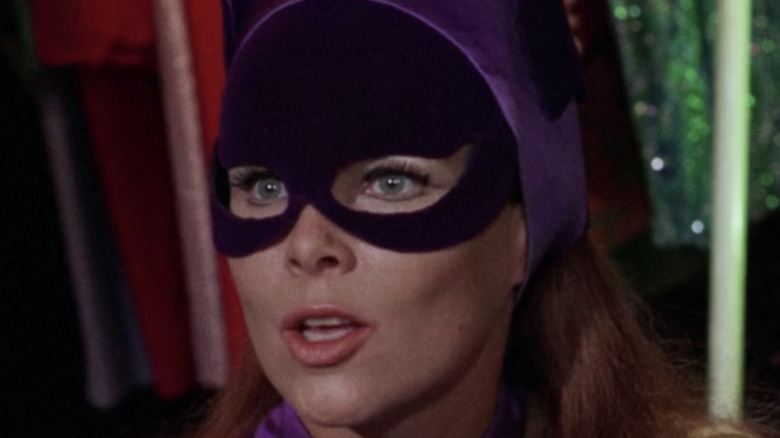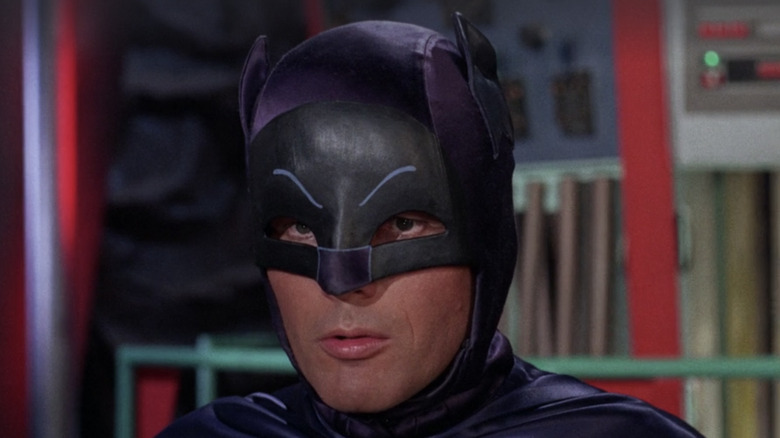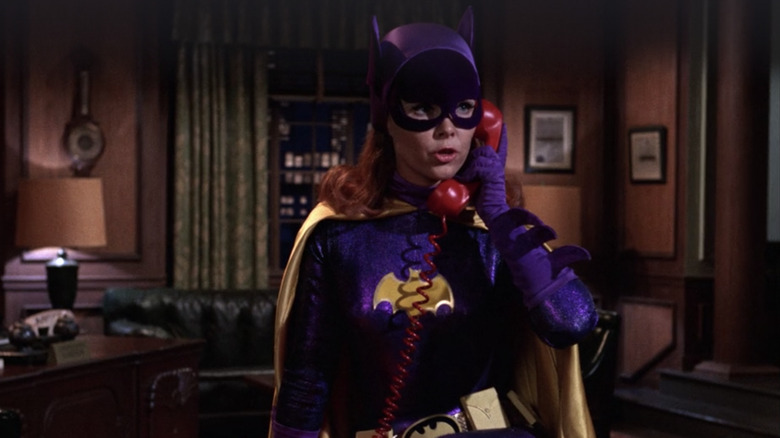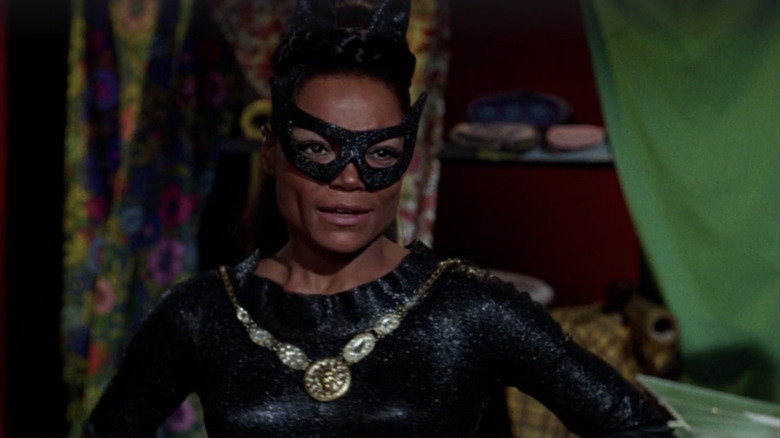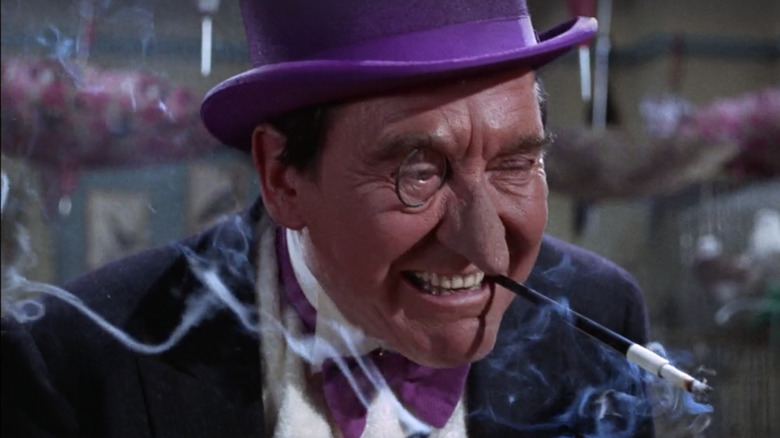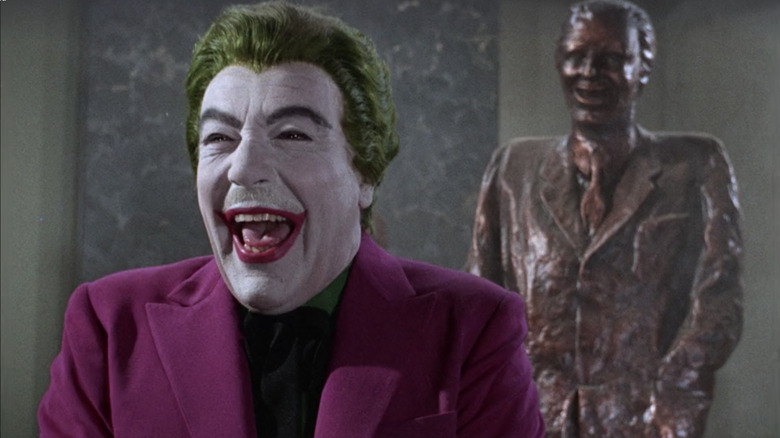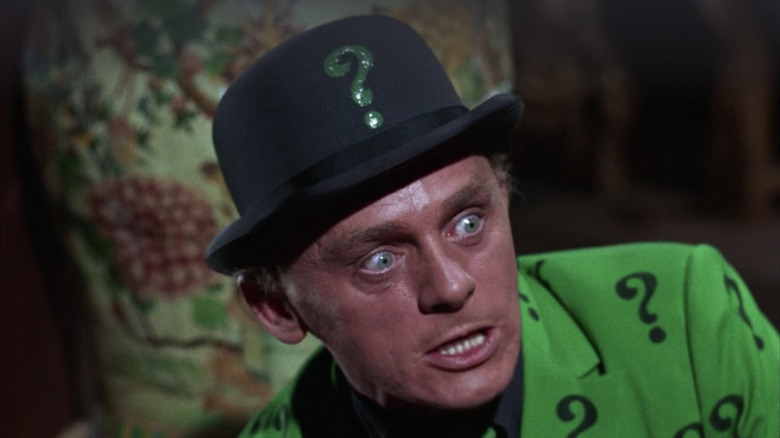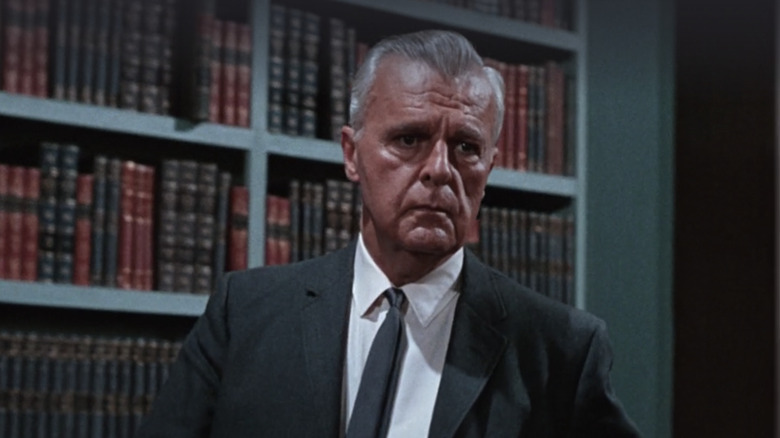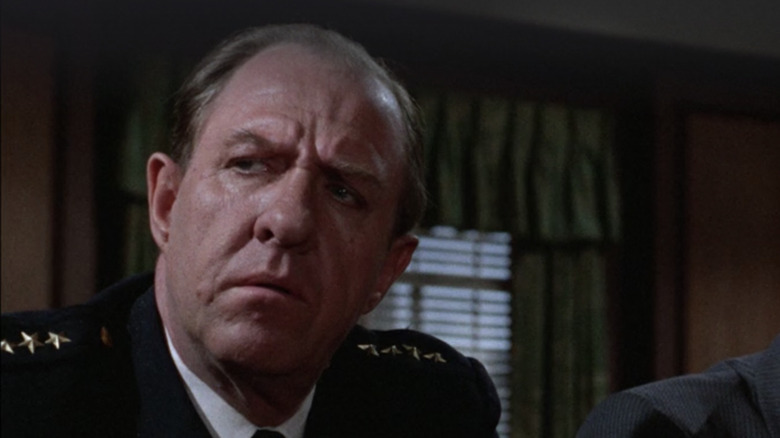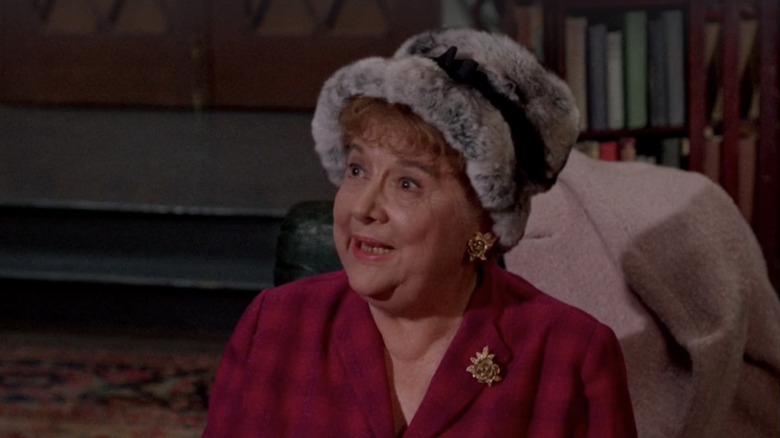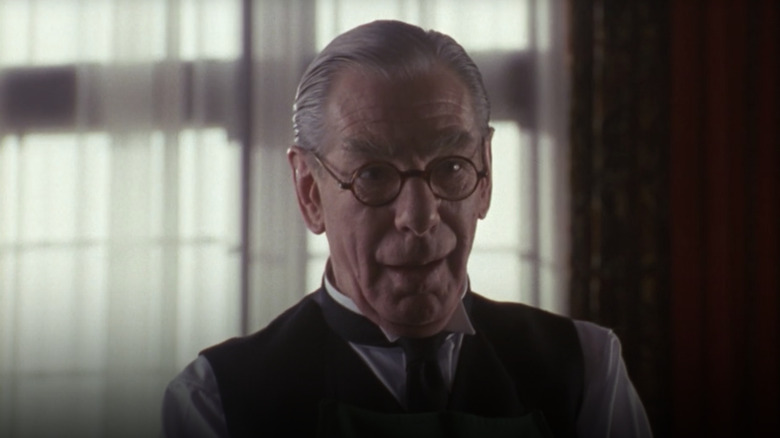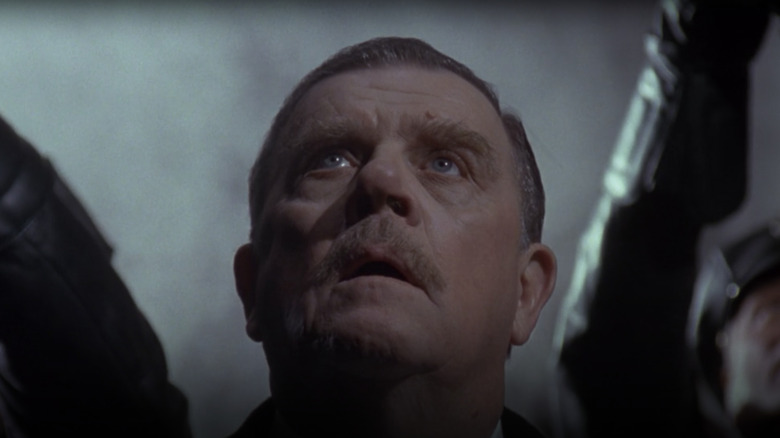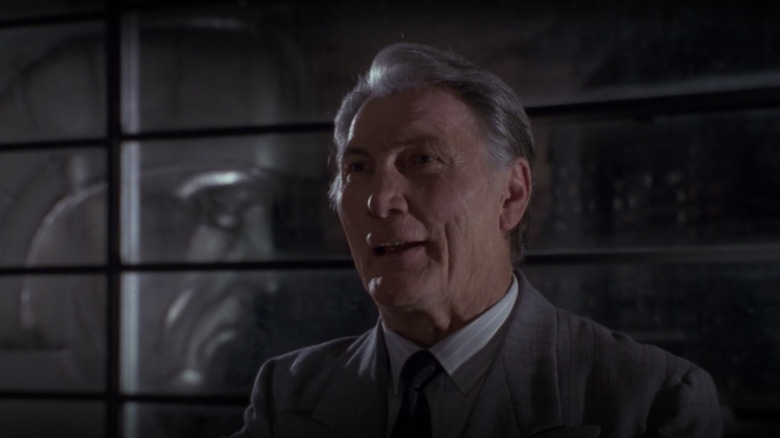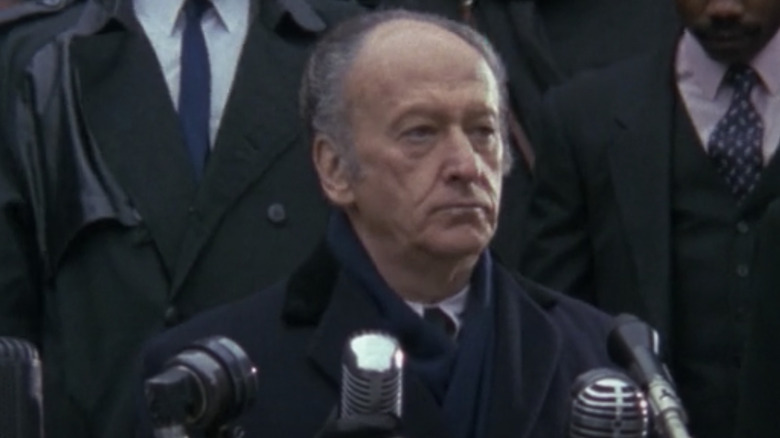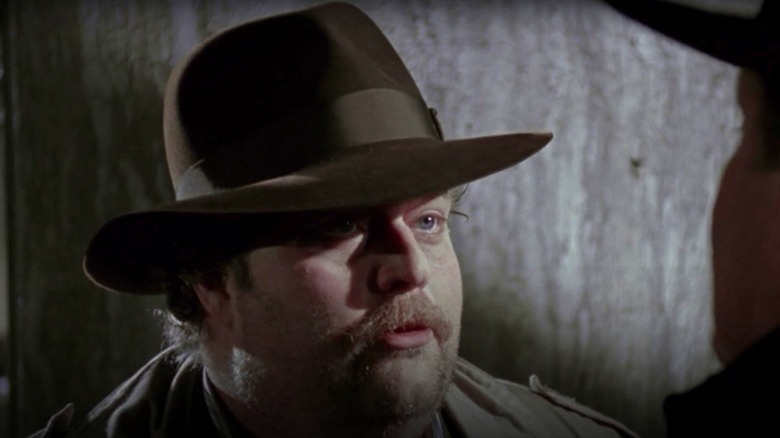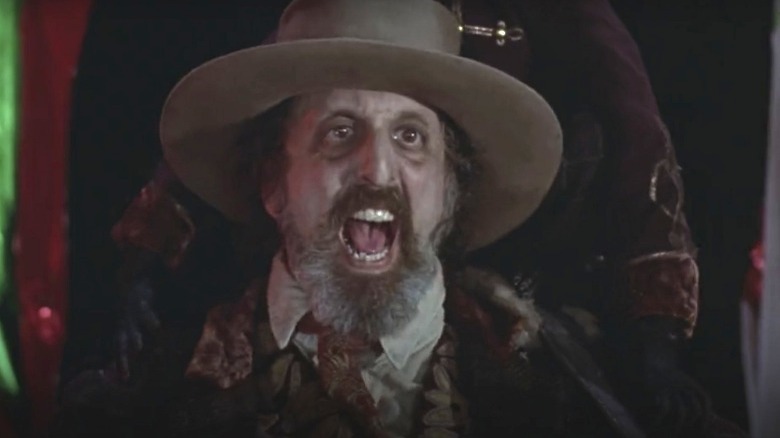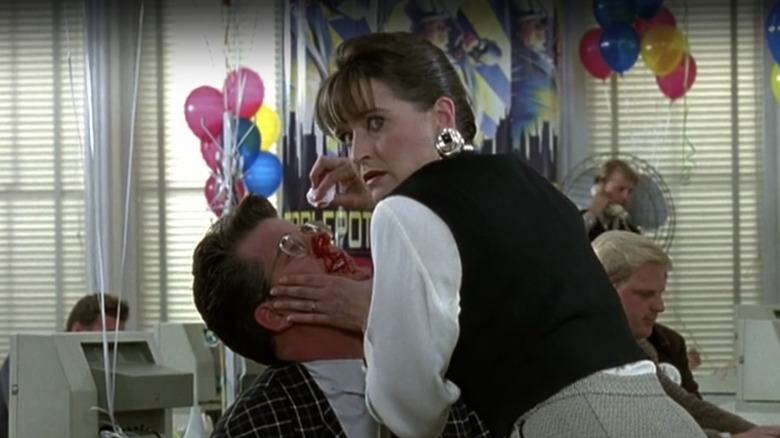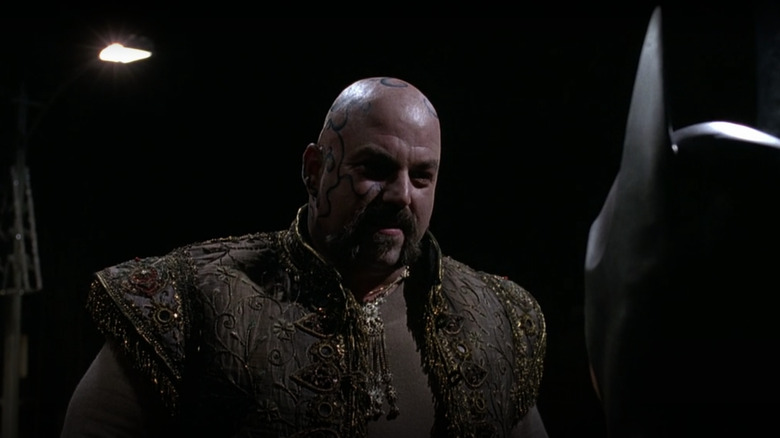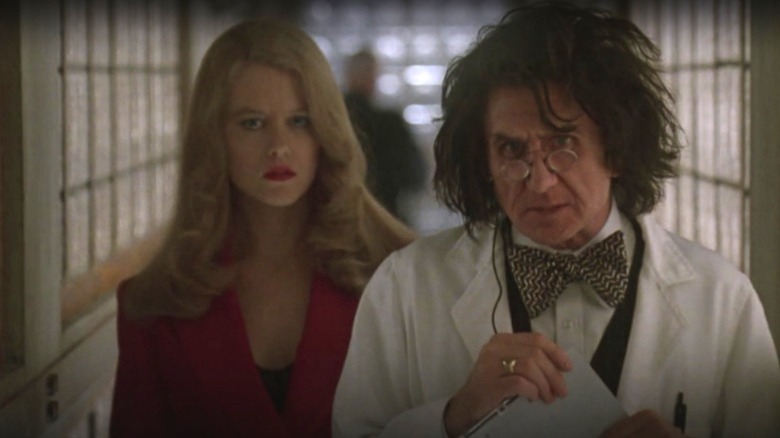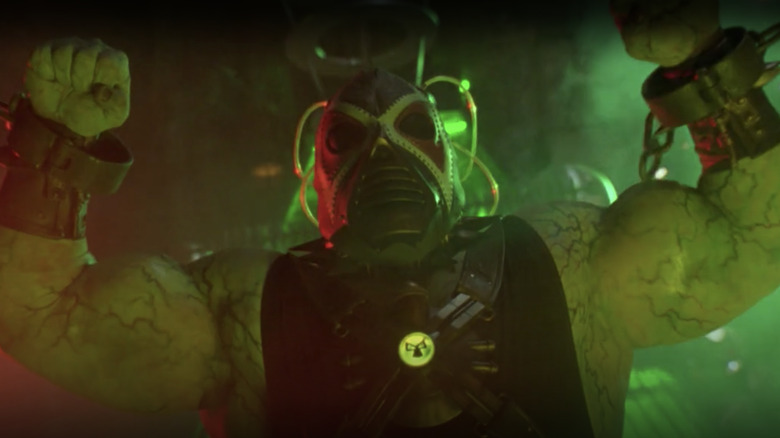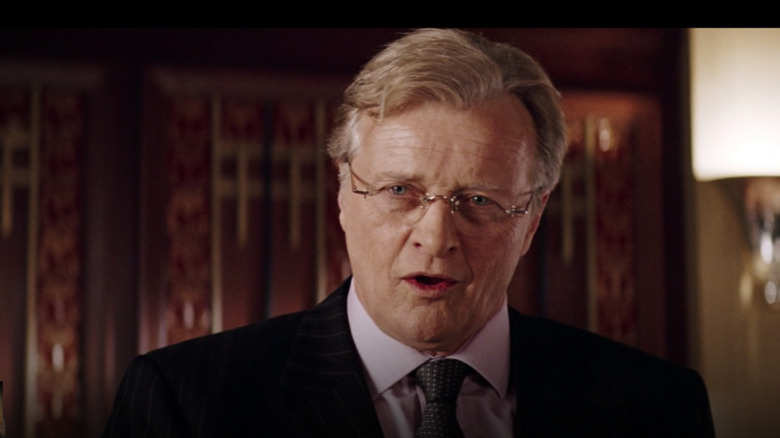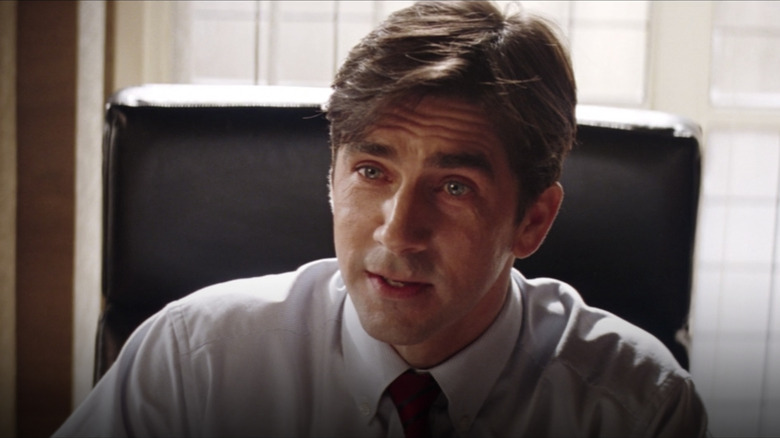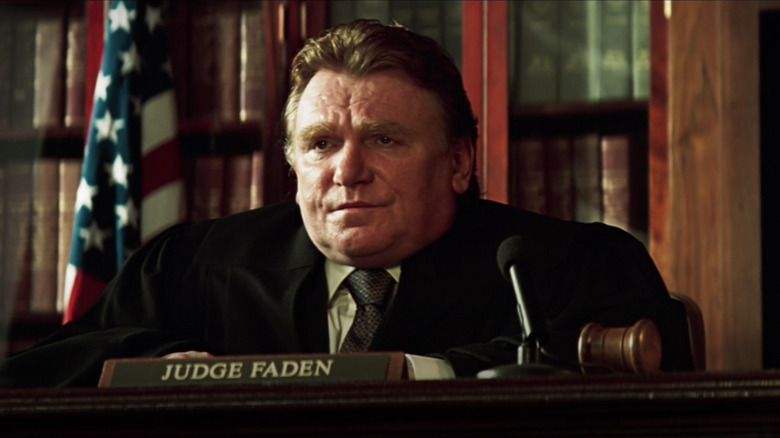Batman Actors You May Not Know Passed Away
For over 80 years, Batman has thrilled comic book readers with his many adventures, and he's been exciting film and television audiences for nearly as long. After a pair of movie serials in the 1940s, Batman and Robin made their first big live-action splash on the classic 1966 television series "Batman," a knowingly campy, pop-art influenced comedy featuring wacky gadgets, guest stars hamming it up in villain roles, and dozens upon dozens of henchmen.
In 1989, the Dark Knight returned to the big screen in Tim Burton's "Batman." The megahit film was influenced by the darker, more serious tone of the character's comic book adventures in the 1970s and '80s and influenced the next several decades of superhero blockbusters (via The Washington Post). Batman is still going strong, with a brand new adaptation from director Matt Reeves ("The Batman") in theaters now.
With a legacy that spans so many decades, many actors who made their mark in Batman films and shows are no longer with us, some after long and celebrated lives, and some taken tragically too soon. Here is a list of "Batman" actors from the 1960s onward you may not know have passed away.
Adam West
Adam West was television's first Caped Crusader and set the example for Batman actors to come, either as a style to emulate or avoid. As the Batman for the 1966 series, though, he brought a perfect mix of deadpan silliness to the role, whether trying to get rid of a bomb or inventing a new dance.
Born William West Anderson in 1928, the actor got his start on television as an announcer for American Forces Network during a stint in the U.S. Army (via The Hollywood Reporter). Odd jobs in television, films, and commercials followed, including hosting a daytime show in Hawaii with a chimpanzee and a series of James Bond-style Nestle's Quik commercials, which caught the eye of "Batman" producer William Dozier. After the show ended in 1968, West appeared in films like "Hooper" and "The Happy Hooker Goes Hollywood" and voiced Batman for several animated series, but he struggled with being typecast. In 1990, he starred in Conan O'Brien's unaired but still widely seen television pilot "Lookwell" and found a niche playing himself as a Batman-esque buffoon in shows like "The Simpsons," "NewsRadio," and "Family Guy," where he had a recurring role as the mayor of Quahog, Rhode Island. West died in 2017 after a short battle with leukemia; he was 88.
Yvonne Craig
Actor and dancer Yvonne Craig joined the cast of "Batman" in Season 3 as Commissioner Gordon's daughter Barbara, who secretly fights alongside the Dynamic Duo as Batgirl. Known for her sparkly purple outfit, red wig, and motorcycle, this version of Batgirl made her television and comic book debuts at the same time and continues to influence the character both on the page and on screen.
Craig got her start as a dancer in the Ballet Russe de Monte Carlo and fell into acting almost by accident — she was spotted at a restaurant by the son of director John Ford (via NPR). From there, she appeared in the 1959 Western "The Young Land" opposite John Wayne's son Patrick and Dennis Hopper. Her career consisted of small television roles both before and after "Batman," and in later years, she worked in commercial real estate and had a prepaid phone card business with her sister. She had a recurring role as Grandma on the Nick Jr. animated series "Olivia" from 2009 to 2011. Craig died of breast cancer in 2015
Eartha Kitt
Stage, screen, and style icon Eartha Kitt took over the role of Catwoman from Julie Newmar in Season 3 of "Batman," appearing as the feline foe in just three episodes (with quick cameos in two more). Nevertheless, she immediately made the role her own with every sultry "purrrr" pun the writers could give her.
Born into poverty in South Carolina and raised in Harlem, Kitt left school at age 15, and by 16, she was a dancer and singer with the Katherine Dunham Group (via The Hollywood Reporter). Her cabaret acts were the toast of Paris and New York City, and her 1953 recording of the Christmas song "Santa Baby" has been a holiday staple for decades. In 1958, she starred in films alongside Sidney Poitier and Sammy Davis Jr., and her distinctive voice made her an in-demand voiceover actor throughout her career, perhaps most notably as the villainous Yzma in the 2000 Disney hit "The Emperor's New Groove." Kitt died on Christmas Day 2008 at the age of 81.
Burgess Meredith
Legendary screen actor Burgess Meredith waddled into the hearts of Gen-X kids everywhere as the Penguin, perhaps Batman's greatest villain. The cackling, top-hat-wearing, cigarette smoking bird-themed evildoer appeared in the series' third episode and made over 20 appearances across all three seasons and its 1966 feature film spin-off.
The Cleveland-born actor first made a name for himself as the lead in Maxwell Anderson's Broadway play "Winterset," as well as its 1936 film adaptation. Meredith began appearing on television as early as 1949 and was a welcome presence on shows such as "The Twilight Zone" and "Rawhide." He was nominated for the Oscar for best supporting actor two years in a row for 1975's "The Day of the Locust" and 1976's "Rocky," where he played Rocky Balboa's hardscrabble trainer Mickey (Burgess reprised the role three more times). In the '90s, he scored a pair of hit films opposite Jack Lemmon and Walter Matthau in "Grumpy Old Men" and its sequel. Meredith died in 1997 after suffering from melanoma and Alzheimer's disease.
Cesar Romero
If there is anyone who might challenge Burgess Meredith as "Batman's" greatest villain, it would be Cesar Romero as The Joker. The Clown Prince of Crime appeared in over 20 episodes as well as the 1966 film, challenging Batman to a surf contest and teaming up with Catwoman to steal a music mogul's antique nightshirt. The role reinvigorated Romero's career at age 59 and introduced him to a new generation of fans — and he did it all without having to shave his mustache.
Before "Batman," the New York City native had a long career stretching back to the 1930s, where he often played stereotypical "Latin Lover" roles (per The Hollywood Reporter). He starred opposite Frank Sinatra several times, including in the original "Ocean's 11" in 1960. Like many actors of his generation, his focus turned to television as film roles began to dry up; after "Batman" ended in 1968, Romero remained an in-demand guest star on television for the rest of his life and had a recurring role on the primetime soap "Falcon Crest" from 1985 to 1988. He died in 1994.
Frank Gorshin
Frank Gorshin appeared as the Riddler in the first two episodes of "Batman," ensnaring the Dark Knight in a lawsuit and disguising his henchwoman (future Bond girl Jill St. John) as Robin. Alongside Lee Meriwether as Catwoman, Gorshin, Meredith, and Romero were the quartet of foes for the 1966 film. Gorshin appeared on 10 episodes across all three seasons and was nominated for an Emmy in Season 1, the only actor to be recognized in the entire run of the show.
Born in Pittsburgh in 1933, Gorshin's main act as an entertainer was as an impressionist, doing vocal impersonations of the stars of the day, including Bobby Darin, Dean Martin, and James Cagney (per the Chicago Tribune). He was a guest on "The Ed Sullivan Show" many times, including the famous 1964 episode that introduced The Beatles to American audiences. After "Batman" he remained a fixture on television and on stage for decades, often returning to the superhero genre with guest spots on "Wonder Woman," Robert Townsend's comedy "The Meteor Man," and voicing Batman villain Hugo Strange on the 2004 WB cartoon "The Batman." Gorshin died of lung cancer in 2005.
Neil Hamilton
As Commissioner Gordon, actor Neil Hamilton was featured on every episode of "Batman." The ever-credulous, good-natured top cop of Gotham City had to turn a blind eye to any number of things, such as the striking similarities between the Dynamic Duo and millionaire philanthropist Bruce Wayne and his youthful ward Dick Grayson, as well as the fact that his daughter Barbara always seemed to be nearby (but never in sight) when Batgirl was around.
The role of Commissioner Gordon arrived at the end of an illustrious career that began in the silent era. Hamilton was born in 1899 and performed in dozens of films before the advent of sound, including D.W. Griffith's "The White Rose" and the first screen adaptation of "The Great Gatsby," where he played Nick Carraway. In 1960, he received his own star on the Hollywood Walk of Fame. Hamilton had just a handful of credits after "Batman" and died in 1984.
Stafford Repp
Commissioner Gordon's second-in-command on "Batman" — his very own Robin in a way — was Chief O'Hara, the thick-brogued policeman played by California native Stafford Repp. If anything, Chief O'Hara was even more amazed by the Dynamic Duo's exploits than Gordon was, often punctuating scenes with a heavily-accented "saints preserve us!"
Repp got his start on stage in California in the years before World War II. During the war, he joined the U.S. Army and produced comedy revues with his fellow soldiers that toured bases and local venues. His army background and weathered face made him a natural choice to play police, military officers, and other authority figures during his decades in Hollywood. He continued to work for nearly a decade after "Batman" on shows like "M*A*S*H" and "Gunsmoke," and had a role in the lost Orson Welles film "The Other Side of the Wind," which was finally completed and released in 2018. Repp died in 1974.
Madge Blake
Even superheroes need some caretaking, and Alfred can't do everything. Enter Dick Grayson's Aunt Harriet, played by character actress Madge Blake, Gotham's busiest busybody. The flighty Aunt Harriet often finds herself involved with Batman and Robin's adventures in one way or another, never quite figuring out the truth about her teenage nephew and his adult male guardian.
Blake, born in Kansas in 1899, came to acting later in life, studying at the Pasadena Playhouse in the late 1940s and landing small parts in films such as "Singin' in the Rain" and "Ain't Misbehavin'" and guest roles on "I Love Lucy" and "Leave It to Beaver." Blake appeared in every episode of "Batman" for its first two seasons, but health issues led to her taking a much smaller role in Season 3 (just two episodes), which is when the entire cast heads off to the great European city of "Londinium." She died of a heart attack in 1969.
Michael Gough
Bruce Wayne's loyal butler Alfred is many things: his counselor, his collaborator, his conscience. He's a father figure and a tether to humanity, a constant in the chaos. Prolific British actor Michael Gough made that constancy literal, playing Alfred across the first four films of Batman's modern era opposite three different Bat-stars — Michael Keaton, Val Kilmer, and George Clooney.
Gough was born in Kuala Lumpur in 1916 and studied acting in London at the Old Vic theatre. A consummate character actor, Gough would hold his own against many of the titans of the 20th-century stage, including Laurence Olivier and Alec Guinness. On film, he appeared in everything from the star-studded "Julius Caesar" adaptation to the Joan Crawford horror curio "Trog," both in 1970. 1997's "Batman & Robin" was his last visit to the Batcave (other than a series of commercials for OnStar in 2000), but he remained a favorite of director Tim Burton, appearing in "Sleepy Hollow" and lending his distinctive voice to "Corpse Bride" and 2010's "Alice in Wonderland." Gough died in 2011.
Pat Hingle
Like Michael Gough, character actor Pat Hingle appeared in 1989's "Batman" and its three sequels. As Commissioner Gordon, Hingle brought a quiet authority and realism to a larger-than-life series, whether he was trying to arrest the Dark Knight in "Batman" or cheering on the Batwing in "Batman Forever."
Born in 1924, Hingle served in the Navy during World War II and went on to study acting at the famed Actors Studio in New York City (per Variety). He was a fixture on television for nearly 50 years, with recurring roles on "Gunsmoke," "Hawaii Five-O," and "In the Heat of the Night." On film, he was a great heavy, playing the villain opposite Clint Eastwood in 1968's "Hang 'Em High" and making a poignant turn as Sally Field's father in "Norma Rae." In later years, he appeared in "Talladega Nights: The Ballad of Ricky Bobby" and John Singleton's 2000 remake of "Shaft." He died in 2009 at age 84.
Jack Palance
One of the great film villains of the 20th century, actor Jack Palance is perhaps one of the few actors who could out-menace Jack Nicholson. As jealous crime boss Carl Grissom in "Batman," he sets the plot in motion by sending his gangster underling Jack Napier (Nicholson) on an assignment to Axis Chemicals from which he is not meant to return. But Jack does return, as the villainous, disfigured Joker, gunning down Grissom in his office and taking over his criminal enterprise.
Born Vladimir Palahniuk in 1919, Palance served in World War II and went to New York to become an actor after a brief try at college in North Carolina. He received two Oscar nominations early in his career, one for "Sudden Fear" in 1952 and the other for "Shane" in 1953. The latter is arguably his most famous role until he played dying cowboy Curly in 1991's "City Slickers," for which he won the Oscar for best supporting actor. Many of his films in between were low-budget B-movies, and Palance was always candid about the variable quality of his work. He died in 2006 of natural causes at age 87.
Lee Wallace
Character actor Lee Wallace appears in "Batman" as Gotham City's panicked mayor, trying to plan a bicentennial celebration for the city in the midst of the Joker poisoning citizens with household beauty products, and leaning on Commissioner Gordon and district attorney Harvey Dent (Billy Dee Williams) to do something about it.
This wasn't the first time that Wallace, born Leo Melis in 1930, played a comically ineffectual mayor — in 1974, he played the bed-ridden mayor of New York City in the crime classic "The Taking of Pelham One Two Three." Wallace had a strong run of supporting roles in classic films during the 1970s and '80s, including "Klute," "The Hot Rock," and "Private Benjamin." He also appeared on stage on Broadway and in regional theatre, including a 1981 Yale production of "Uncle Vanya" starring Glenn Close. Wallace's last film appearance was in 1992's "Used People." He died in 2020 at age 90.
William Hootkins
In "Batman," William Hootkins plays Lt. Eckhardt, the face of police corruption in Gotham City. Openly on the take from crime boss Carl Grissom, his adversarial relationship with Jack Napier results in the soon-to-be Joker gunning him down during the raid on Axis Chemicals.
Born in Dallas, Hootkins attended the prep school St. Mark's alongside fellow thespian Tommy Lee Jones (per The Guardian). After studying at Princeton, Hootkins moved to London, where he would live and work for most of his life. While famous in the U.K. for playing historic figures such as Winston Churchill and Alfred Hitchcock, he is perhaps best known in the U.S. for a pair of George Lucas collaborations. In 1977, he appeared in "Star Wars" as Rebel pilot Porkins, and in 1981, he played Major Eaton, the government agent who assures Indiana Jones that "top men" are working on the Ark of the Covenant at the end of "Raiders of the Lost Ark." Hootkins died of pancreatic cancer in 2005.
Vincent Schiavelli
Vincent Schiavelli just had one of those faces — a character actor's face, distinctive and immediately compelling. As a member of the Penguin's (Danny DeVito) circus gang in "Batman Returns," Schiavelli's Organ Grinder stands out as much for his droopy, haunted face as for his Gatling gun organ or the monkey at his side.
The prolific New York-born actor had Marfan syndrome as a child, which perhaps contributed to his thin, lanky physique as an adult. Schiavelli was a favorite actor of director Milos Foreman, who cast him in "One Flew Over the Cuckoo's Nest," "Amadeus," and "Man in the Moon." He had memorable turns in "Fast Times at Ridgemont High" and "Ghost" (where he plays a subway station spirit who teaches Patrick Swayze how to haunt), and he even plays a James Bond villain in "Tomorrow Never Dies." Schiavelli was also an avid chef and writer; his 2000 Los Angeles Times article "Sicilian Summers" won a James Beard Award for journalism. Schiavelli died of lung cancer in December 2005.
Jan Hooks
Comedian Jan Hooks makes a quick cameo in "Batman Returns" as Jen, one of two PR flaks (alongside Steve Witting) hired by evil businessman Max Schrek (Christopher Walken) to make the Penguin palatable as a mayoral candidate. Her big idea? Put gloves on his flippers, as their research shows that voters like fingers.
Hooks got her start on television in her native Georgia, starring on "The Bill Tush Show" of TBS in 1980. She then appeared on the 1st and 2nd seasons of the early HBO sketch comedy series "Not Necessarily the News," which had a young Conan O'Brien in the writer's room. In 1985, she had a small role as a perky Alamo tour guide in Tim Burton's "Pee-wee's Big Adventure," and in 1986, she joined the cast of "Saturday Night Live" for five seasons. After "SNL," she starred in the last two seasons of "Designing Women" and had recurring roles on "Third Rock from the Sun," "The Simpsons," and "30 Rock." Hooks was diagnosed with leukemia in 2009 and died of throat cancer in 2014.
Rick Zumwalt
It's left to the viewer's imagination, but it sure does seem like Batman murders the circus gang strongman played by Rick Zumwalt in "Batman Returns." Carrying a ticking dynamite bomb, Batman punches his way through several killer clowns before reaching Zumwalt's unnamed character. Zumwalt stands up to Batman's punches but doesn't realize that the Dark Knight has stuffed the bomb into the strongman's pants. With a grin, Batman throws Zumwalt down a construction shaft, which is followed by the sound of an explosion and a burst of confetti. Perhaps it was a trick bomb? We'll never know.
A former arm-wrestling world champion, Zumwalt got his start in Hollywood on the Sylvester Stallone arm-wrestling movie "Over the Top." He appeared in over two dozen films and television shows, including "Married ... with Children," "Jake and the Fatman," and the Patrick Swayze family comedy "Father Hood," often playing intimidating figures due to his size and stature. Zumwalt also performed for a time with Cirque du Soleil as a strongman. He died in 2003 at age 51.
Rene Auberjonois
Veteran character actor Rene Auberjonois has just a brief role at the end of "Batman Forever" as Arkham Asylum caretaker Dr. Burton (whose name is perhaps a nod to Tim Burton, who did not return to direct this sequel, though remains credited as a producer). He tells Dr. Chase Meridian (Nicole Kidman) that the asylum's new patient, The Riddler (Jim Carrey), has been screaming that he knows the secret identity of Batman. Chase, Bruce Wayne's current love interest, is understandably concerned that her man's spot might get blown up, but luckily, the Riddler has been driven mad by his own mind control device and claims that he himself is the Caped Crusader.
Auberjonois was born into the life of an international artist, growing up in New York, Paris, and London (per The Hollywood Reporter). His father was a foreign correspondent, and his namesake grandfather was a Swiss painter. Auberjonois began acting on Broadway in the late 1960s before making the leap to film and television in the early 1970s. He was a near-constant presence on screen for the rest of his life, either as a regular on shows like "Benson" and "Star Trek: Deep Space Nine" or as a prolific guest star on everything from "Charlie's Angels" to "Madam Secretary," not to mention dozens of voiceover roles. Auberjonois died in 2019 of lung cancer at 79 years old.
Robert 'Jeep' Swenson
Fifteen years before Tom Hardy brought the role to life in "The Dark Knight Rises," professional wrestler Robert Swenson (aka "Jeep") brought a decidedly different take on the supervillain Bane to life in 1997's "Batman & Robin." The super-strong yet erudite bad guy is rendered here as a mute, grumbling hulk and henchman to Poison Ivy (Uma Thurman).
Swenson wrestled for the WCW organization in the 1980s and was a professional boxer for a short time. He got his start in film with a small role in Jackie Chan's "Battle Creek Brawl," but his big break was nearly a decade later, playing a professional wrestler in the Hulk Hogan vehicle "No Holds Barred." Swenson appeared on episodes of "Walker, Texas Ranger" and had a supporting role in the action-comedy "Bulletproof" as villain James Caan's bodyguard. Sadly, he died of heart failure at age 40, just two months after "Batman & Robin" was released.
Rutger Hauer
In "Batman Begins," Dutch actor Rutger Hauer plays William Earle, the businessman who has assumed control of Wayne Enterprises in the absence (and presumed death) of Bruce Wayne (Christian Bale). His plan to take the company public puts him at loggerheads with some of the other employees, particularly Lucius Fox (Morgan Freeman), who will soon become Batman's armorer. This corporate intrigue plot mostly plays out in the background until the end of the film, when Bruce reveals that he has purchased a controlling interest in the company and is installing Lucius as Earle's replacement.
With his matinee-idol looks and taste for provocative work, Hauer became a star in his native Netherlands during the 1970s, collaborating with director and kindred spirit Paul Verhoeven on many films and television projects, including "Turkish Delight" and "Soldier of Orange" (per Variety). He made the move to Hollywood in 1981, playing the villain in Sylvester Stallone's cop thriller "Nighthawks." The next year, in 1982, Hauer delivered arguably his signature performance as philosophical android Roy Batty in Ridley Scott's sci-fi noir classic "Blade Runner." Hauer would specialize in genre films over the next several decades, playing heroes and villains alike in "The Hitcher," "Blind Fury," "Buffy the Vampire Slayer," and "Sin City." Hauer died in July 2019 at age 75.
Larry Holden
Actor Larry Holden appeared in several of director Christopher Nolan's early films, including "Memento" and "Insomnia." In "Batman Begins," he plays Gotham district attorney Carl Finch — boss of Bruce Wayne's childhood friend Rachel Dawes (Katie Holmes) — who meets his end when he stumbles upon what the Gotham mob and the sinister League of Shadows are up to.
A graduate of Towson University in Baltimore, Holden's first decade or so in front of the camera was mostly on television, with appearances on the USA detective series "Silk Stalkings," as well as "CSI" and "ER." In the 2000s, he began to pursue a career behind the camera as well, and his film "My Father's House" won a prize at the 2002 New York International Film and Video Festival. Holden died of cancer in 2011 at age 49.
Gerard Murphy
In "Batman Begins," Irish actor Gerard Murphy played the corrupt Judge Faden, who presides over the parole hearing of Joe Chill (Richard Brake), the man who killed Bruce Wayne's parents. Chill was the cellmate of Gotham crime boss Carmine Falcone (Tom Wilkinson) and has information that could put Falcone behind bars for good — that is until Chill is conveniently gunned down outside of the courtroom. Later, we see Faden carousing at Falcone's bar.
Born in County Down, Northern Ireland, in 1948, Murphy was a prolific stage actor across the U.K., working with Citizens' Theatre Company in Glasgow throughout the 1970s before becoming an artistic associate with the Royal Shakespeare Company after 1977. During this time, he also began a long and robust television career for the BBC, appearing in play adaptations such as "The Playboy of the Western World" in 1974 and the pilot episode of "Father Ted" in 1996. After "Batman Begins," Murphy remained primarily a stage and television actor, joining the U.K. touring company of Alan Bennet's hit play "The History Boys" in 2010 and returning to Citizens' Theatre for his final theatrical performance in the Samuel Beckett short play "Krapp's Last Tape." Murphy died from cancer in 2012.
